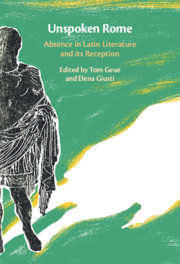Book contents
- Unspoken Rome
- Unspoken Rome
- Copyright page
- Contents
- Figures
- Unspoken Rome: Acknowledgements
- Contributors
- Introduction
- Part I Absence in Text
- Part II Absence in Context
- Part III Going Beyond
- Chapter 13 The Slave, Between Absence and Presence
- Chapter 14 In Search of the Lost City
- Chapter 15 Omnibus umbra locis adero
- Chapter 16 The Philology of Grief
- Chapter 17 Absence, Metaphysically Speaking
- Afterword Lights Out
- Bibliography
- General Index
- Index Locorum
Chapter 14 - In Search of the Lost City
The Enduring Absence of Pompeii
from Part III - Going Beyond
Published online by Cambridge University Press: 03 September 2021
- Unspoken Rome
- Unspoken Rome
- Copyright page
- Contents
- Figures
- Unspoken Rome: Acknowledgements
- Contributors
- Introduction
- Part I Absence in Text
- Part II Absence in Context
- Part III Going Beyond
- Chapter 13 The Slave, Between Absence and Presence
- Chapter 14 In Search of the Lost City
- Chapter 15 Omnibus umbra locis adero
- Chapter 16 The Philology of Grief
- Chapter 17 Absence, Metaphysically Speaking
- Afterword Lights Out
- Bibliography
- General Index
- Index Locorum
Summary
Soon after the eruption of Vesuvius in 79 CE, Pompeii seemed to have vanished. The buried city maintained a presence in the region’s collective memory primarily as an overwhelming absence, repressed even in the near-contemporary poetry that ruminated on its demise. In such texts, the name of Pompeii is conspicuous by its absence, and the shock over the swallowing up of this solid ancestral ground is keenly felt. This chapter argues that Martial, Statius, and others initiate the trope of Pompeii as an absent presence that continues to characterize our responses to the site today, even in the face of the apparently abundant materiality of the site. By following Pompeii’s disappearing act from these Latin authors through a variety of more recent engagements with the city – from the subterranean journey to the site in Jacopo Sannazaro’s Arcadia (1504), to the sci-fi dislocation of the city in Amelie Nothomb’s novella, Péplum (1996), and the recent video installation Soleil Noir (2014), in which Pompeii becomes a post-human landscape – we can observe Pompeii’s importance as a locus for understanding the absences that permeate Roman culture, and our modern receptions of it.
- Type
- Chapter
- Information
- Unspoken RomeAbsence in Latin Literature and its Reception, pp. 250 - 269Publisher: Cambridge University PressPrint publication year: 2021



